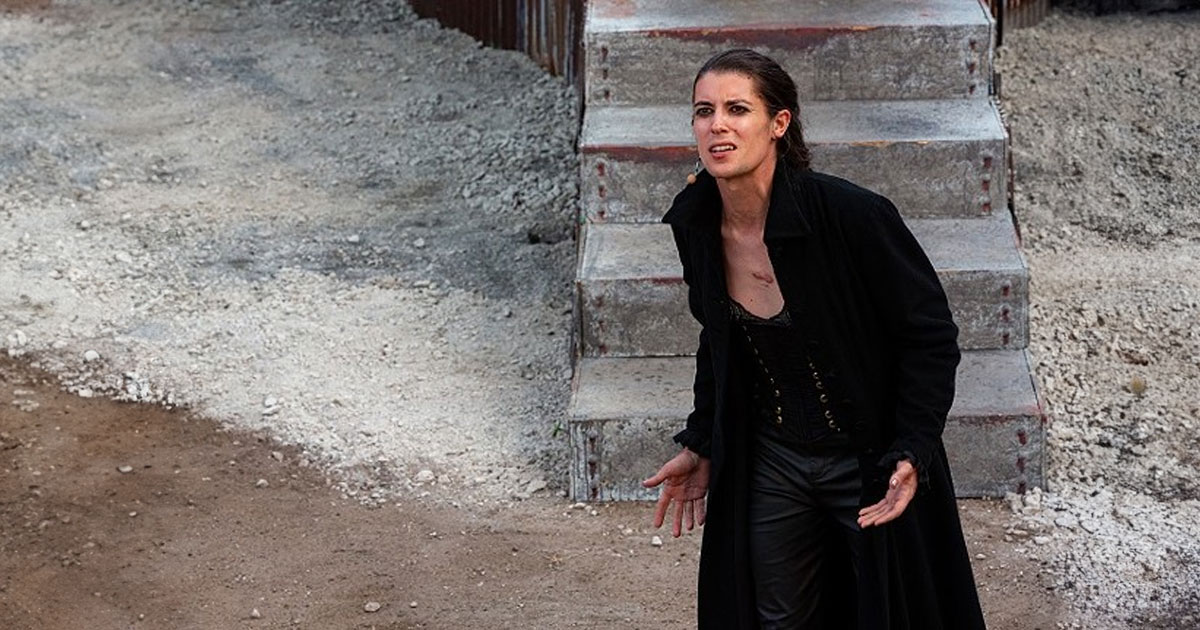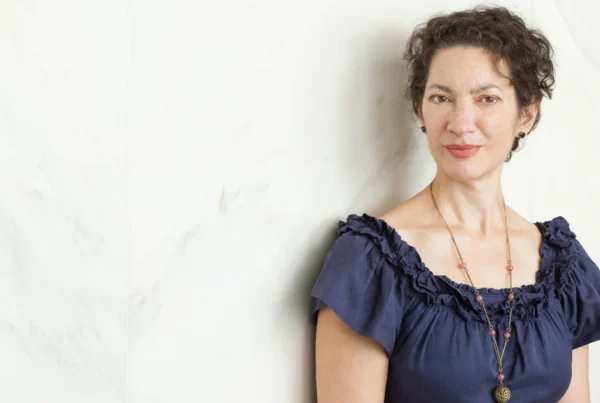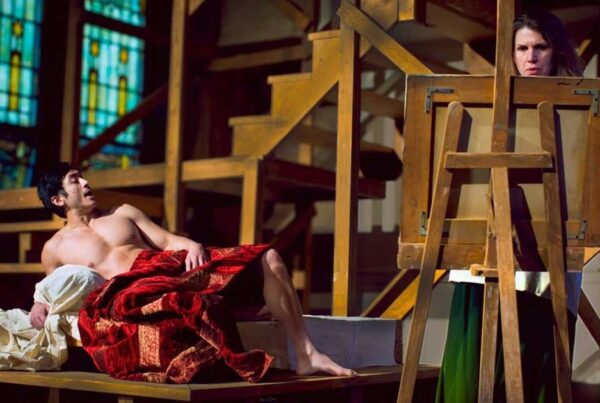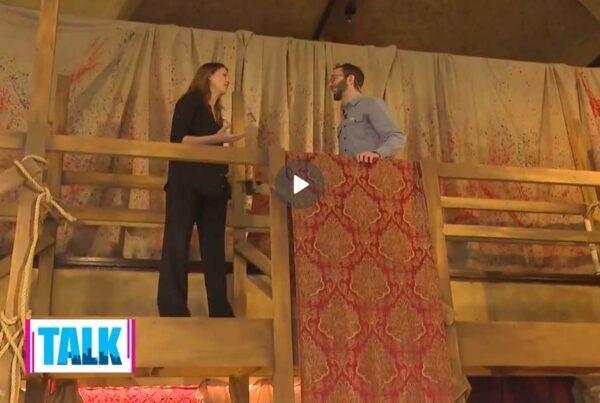
Pittsburgh City Paper – Few Shakespearean works are as rich with subtext as Hamlet. The over 400-year-old play still fascinates audiences and, as a result, has received more than a few modern interpretations on stage and screen.
The already fraught story receives another jolt of complexity through Quantum Theatre, who returned to the Carrie Blast Furnaces — an abandoned steel mill-turned-historical site where, in 2019, the company staged Shakespeare’s King Lear — to present a new take on the work.
Much of the latest interpretation’s weight hinges on Treasure Treasure, who was cast as the vengeful Danish noble. A trans woman with a life of acting experience under her belt, Treasure — who graduated from the Carnegie Mellon University School of Drama in 2013, lived in New York and Los Angeles, and returned to the City of Bridges two years ago — has worked to bring more depth and thoughtfulness the role, telling Pittsburgh City Paper that she, along with the production’s director, Jeffrey Carpenter, and editor, Karla Boos, crafted it in a way that would eschew the play’s misogynistic and Oedipal undertones.
As the production approaches its final weekend, City Paper spoke with Treasure about finding her creative voice again, taking liberties with the Bard’s words, and playing a traditionally male role.
This interview was edited for length and clarity.
Traditionally, are you a theater actor? Have you done film or television work, or anything like that?
Traditionally theater, yeah. I was on stage for the first time at five years old. I was in a musical, and there was this great theater that did summer stock 10 minutes from where I grew up in a place called Elizaville, New York, it’s two hours north of New York City. … And after a couple of years of doing that, I went to New York and started taking on-camera classes as a 7-year-old to learn how to sell Welch’s grape juice.
At the end of a year of taking those classes, I got an agent, and then I booked a Broadway show, and I was able to get out of public school and do tutoring at the theater and just learn how to be a professional at nine years old.
And so I’ve always been in the theater, theater is in my bones. It’s sort of one of these things that I can’t get away from. Even when I when I make music, I’m still thinking about the performance of it.
With an opportunity like Hamlet, did you just audition for it? Or did they reach out to you? How did that come about?
It’s really a wild story. I was invited by a director named Katie Brook, who was getting ready to direct The Cherry Orchard last season. And Katie and I knew each other from CMU, Katie was a grad student when I was doing my undergrad. … She heard that I came back to Pittsburgh and invited me to audition for The Cherry Orchard. I had never auditioned for Quantum. … But [Quantum Theatre’s founder and artistic director Karla Boos] was in the room. … It got up to maybe me and a couple of other actors, and they went in a different direction. But I was so grateful for that experience.
And so, a year goes by, and, randomly, one night, I pick up Hamlet, and I’m reading through a scene that I got to work on in school when I was at Carnegie Mellon. I was reading the closet scene. And I had such an emotional experience reading this because, thinking about 10 years ago, I graduated, and all the life that I lived since then, and how many things have changed, and how I’ve evolved, and how I gained such a deeper understanding of who I am as an artist. And I was thinking back on when I was able to work on Hamlet, I got to work on that scene in school, and it really was the first time that I felt, “I can act. I think I can do this.” … I was always able to sing my way through a room and get people’s attention by my singing voice but acting always felt nebulous. It was for other people to do. And so I really claimed a part of myself when I connected with Hamlet, initially, 10 years ago.
The next morning, I wake up to an email in my inbox from Karla inviting me to audition for Hamlet. Not for the role, but for the play, just letting me know that the play is happening. And that it’s going to happen at Carrie Furnace. That was so exciting to me, of course. I’m still convincing myself that I’m an actor, because I did it so young as a child … when I couldn’t separate myself from the business, and there’s so much restriction in the business. And the business is telling me, “No, no, no, you need to change all these things.” I really internalized a lot of that. … That’s why I started writing and taking photos and editing short, little films. I was so attached to the result of getting an agent or casting director to like me. I lost the flame. So Hamlet is the flame. And it’s wild that we’re doing it in a blast furnace. (laughs)
What has kind been like acting within the space?
Well, the space has always been a challenge. Now that we’re in performance, it’s less of a challenge, because we’re performing at night. We had daytime rehearsals for a couple of weeks. And that was tricky. But in terms of audience reception, audiences are so generous with us. I can really feel them taking in the space, and feeling the weight of the space. They’re hanging on every word. That is such a gift. It’s easy to take that for granted when you’re just trying to get through a play in the elements — we’re outside where there’s no rain cover, there’s no cover from the sun.
It’s really a treat to to have an audience that maybe knows the play but is seeing it in a new way, and hearing it in a new way. … Karla Boos’ edit is very succinct, but very well done. … My first soliloquy is unrecognizable. It’s really like the greatest hits in, you know, a chunk. And to get that soliloquy to an audience that knows, “O, that this too too solid flesh would melt. Thaw and resolve itself into a dew” — our line is, “O, that this too much grief and sullen flesh would resolve to nothing.” It’s a surprise. And I think that soliloquy is an invitation for folks to come in and we’re really saying to them, “Hey, this is gonna be a different experience.”
Obviously, you know Hamlet is a role written for a male person. Was there any discussion about you being a trans woman playing this role?
So when I was initially cast, I had a conversation with Karla immediately. And I knew that I did not want to change the pronouns of Hamlet because it’s so baked into the text. And it’s not just he/him pronouns. There are things written about Hamlet’s gender. I mean, it’s all in there.
I also said to Karla, I am not going to be able to do this role unless I bring myself fully to the character. And so that creates a real fight within the character. As we started to rehearse, I realized that our Hamlet in our play is being misgendered from every angle. And Ophelia (Saige Smith) is perhaps the only person who really sees her. And Horatio (Brett Mack), maybe. There’s real intimacy with Horatio as well. But Ophelia is really a safe haven for my Hamlet. And that’s so heartbreaking.
Jeffrey Carpenter, our director, came to us on the first day and said, “Our play is being performed in Purgatory.” The idea of, we’re in-between worlds. I grew up in a Catholic setting. We didn’t talk about church very often, but I went to Sunday school, which is more of a social thing. So my understanding of Purgatory was rooted in sin — you’ve done something wrong. And you’re stuck in between worlds. But for this Purgatory, I’m thinking about, what does it mean, as a trans person, to exist in the world as it is, and on this plane? It feels like Purgatory in terms of being in between, because I can be outside, out in the world on, you know, walking in the street, and on one block, I’m gendered correctly, and I’m treated as such. And on another block, I am completely misgendered, I don’t know if men are looking at me because they want to sleep with me or they want to kill me.
It’s a strange feeling to also have grown up for so many years in a body that had testosterone ripping through its veins. I mean, was trapped in that body. But as I started to transition and blossom into this woman, I’m treated differently. So Hamlet really is in transition. One of the first things that Claudius (Sam Turich) says to Hamlet — when Claudius sees that Hamlet is grieving so heavily, and, in his opinion, grieving too much, and in such a bombastic way — he says, it is “unmanly grief.” It shows a weakness. So it’s this idea of, as we look at this text, there is so much struggle within Hamlet, of course, because of circumstances, but also with identity. Hamlet does not want to be king. That’s not why Hamlet is upset with Claudius. Hamlet is upset with Claudius before he learns about the death of [his father] and all the circumstances of that. It’s because of Gertrude’s [Hamlet’s mother] relationship with Claudius.
And I [as Hamlet] know that she sees and notices me wearing this corselette, which is a corset that just goes up to under my breasts, and then I’m wearing a lace bra. And, you know, my Hamlet is enraged, she’s fighting to cast off this identity that has been thrust upon her, to be the good son and to be quiet, and to say nothing and to go along with it and be the prince. And I, as Hamlet, I just want to go to Wittenberg. I want to go to study, and I want to learn. I want to hang. I want to be myself. I want to get out of this place, you know. There’s so much to say about that.
And we also cut all of the hyper-misogynistic text on Hamlet’s part. “Frailty, thy name is woman,” all his shaming that Hamlet does of their mother. I mean, Hamlet has to attack Gertrude (Robin Walsh) in the closet scene. It’s so gross, but so often, productions will go in the Oedipal direction, where it’s like, “How could you be with that man?” Like, “Here I can fuck you.” Hamlet says to Gertrude in our play, in terms of the relationship with Claudius, “You cannot call it love, for at your age. The hey-day in the blood is tame, it’s humble, And waits upon the judgment.” And so that is less about shaming her because of her age. … It’s Hamlet trying to reason with her and be like, “How could you have so much love for this man?” It’s almost like a child’s way of understanding love.
Was it similar with Ophelia as well?
Well, so, for Ophelia, in terms of the nunnery, I mean, you can’t get around that. For me, I can justify that in our play as Hamlet knows that [they] are being watched. And so, I am playing their game. And that’s the tragedy, where it’s like, Hamlet has put the love for Ophelia aside as best as she can. The subtext of that scene is her telling me that she loves me, please, come hold me. But Hamlet knows that Claudius and Polonius (Thom Delventhal), the most toxic masculine male characters in the play, are watching. So I have to play their game. And I unfortunately play it so well. But, at the end of the day, like I have to make sense of this. It’s tricky.




